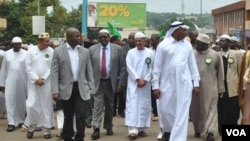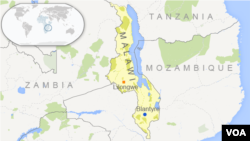Malawi’s minority Muslim population has been pushing the government to declare the Prophet Muhammad’s birthday a public holiday, but the three-year campaign has been plagued by disagreement among Islamic scholars.
Kondwani Nankhumwa, information minister for the southeast African country, told VOA "the government will act accordingly once the issue is discussed at Cabinet level.”
Right now, the only Islamic holiday publicly observed in Malawi is Eid al-fitr, a celebration that marks the end of the Muslim fasting month of Ramadan.
In 2003, Muslims in Malawi started observing Ziyala, as it’s known among the country's Muslims. It is celebrated on the 12th day of Rabi' al-awwal, the third month in the Islamic calendar. This year, the Ziyala parade marking the prophet’s birthday took place January 4.
In calling for a public holiday, Faizal Aboo said Malawi’s government should follow the lead of at least 50 other countries, including Indonesia, Malaysia and Saudi Arabia.
"Malawi should be no different," said Aboo, media coordinator for the Al-Traq Qadeia Sunni Association, a local charity assisting Muslims in Malawi.
The country has nearly 17 million people. Aboo said that, with at least 5 million Muslims among them, officials should give “serious thought” to designating the holiday.
Opposed to celebration
But a group of Muslim scholars discourages the celebration.
Sheikh Imran Sheriff, who chairs the Supreme Council of Ulemas, said: "We don’t celebrate because, according to the Islamic knowledge, Prophet Muhammad was born on 12th Rabi' al-awwal and also died on the same day, same date and same time. And therefore, we feel that it is not advisable to celebrate while the same person is dead."
Sheriff, who lectures in Islamic studies at the Chancellor College of the University of Malawi, also said the style of festivities contradicts the Quran's teachings.
"Those who are championing the celebrations are our Indian Muslim friends," he said. "We have never seen any Indian Muslim woman coming out to celebrate. Yet they encourage Malawian Muslim women to come along with their sisters and their daughters. That is un-Islamic."
Sheriff said Malawi celebrations have included other practices – such as glittering lights, exchanging gifts and erecting shrines on traffic circles or roundabouts – that his group considers un-Islamic.
Sheikh Salmin Omar Idruss, secretary general of the Muslim Association of Malawi, said his group was not consulted by those requesting the holiday designation and therefore does not have an official position.
Personally, he does not support the call for a public holiday, he said.
"I don’t participate [in the celebrations] and I have never participated and I will never," he said. "This is because I don’t subscribe to those types of beliefs. According to how I understand the Islamic text, I know the Prophet did not do it, so why should I?"
Endorsing celebration
But Sheikh Adam Aman King’ombe, a scholar with the Qadria Muslim Association of Malawi, said the Quran allows Muslims to celebrate the day. He quoted a passage, saying, "'‘You the believers, because of getting Quran and Islam as your religion, and to get mercy of Allah, which is the Prophet Muhammad, you have to celebrate.' That’s why we are celebrating."
Another scholar, Sheikh Jafali Kawinga, said there’s nothing wrong in celebrating Muhammad’s birthday. Though the celebration did not occur during the prophet’s life, from 570 to 632, such innovations are allowed in modern Islam.
"For instance, there is an innovation of Ijtema, the gathering of Muslims each and every year," Kawinga said. "It was innovated because it is a time when Muslims meet together and discuss issues pertaining to the religion.
"Likewise, [at] the time of the prophet there was no such [birthday] celebration. But today we celebrate his life and the din [religion] does not prohibit such innovation."









